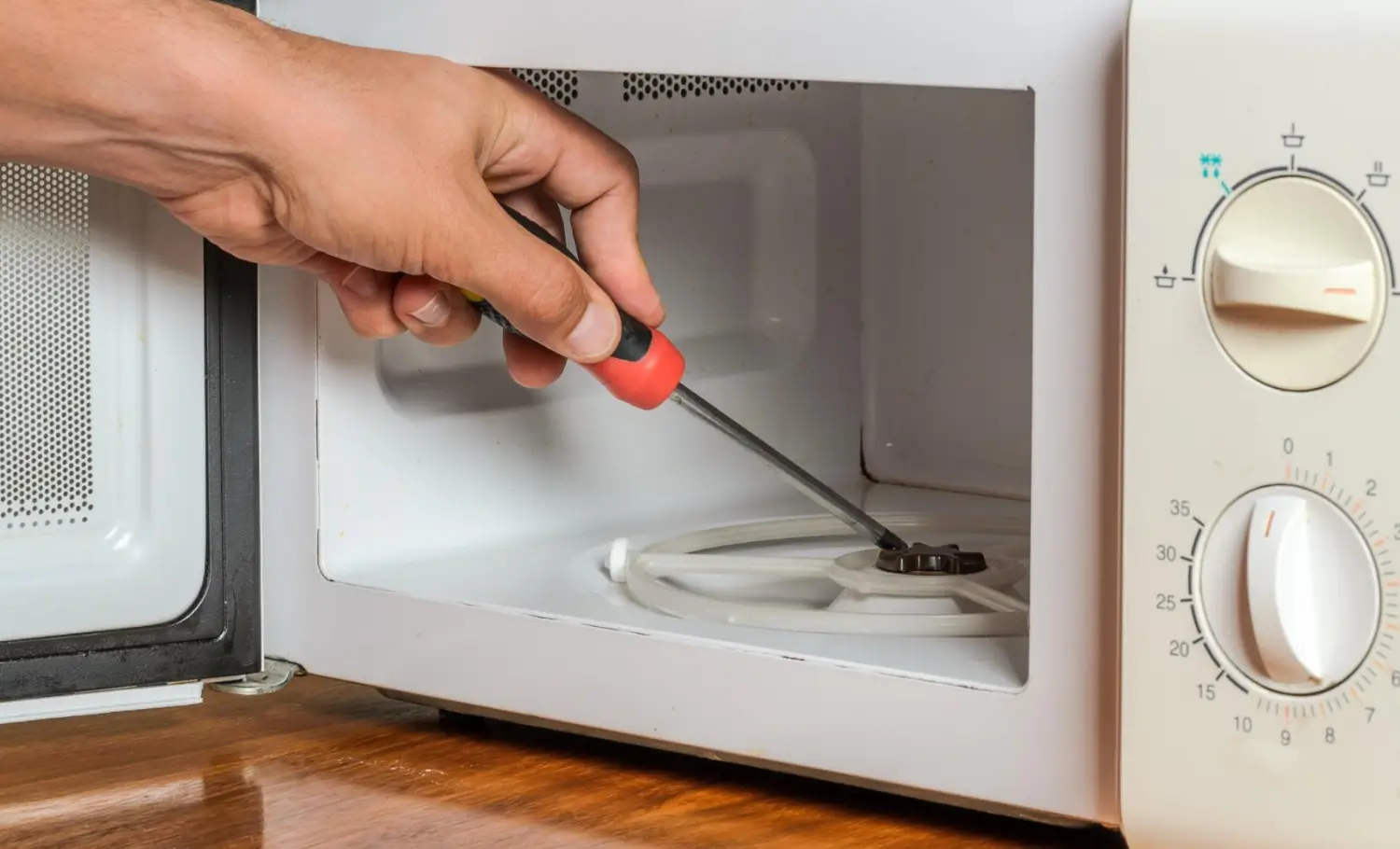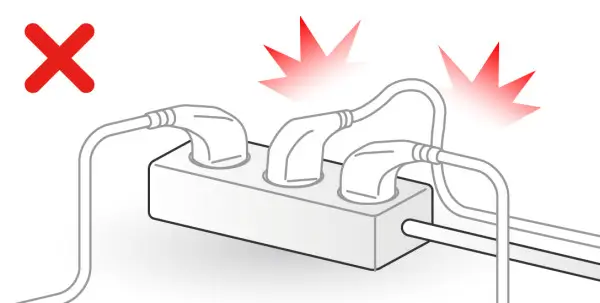microwaver mavens! We’ve all been there – nukin’ up some leftovers or heating a hot pocket when suddenly bam the whole kitchen goes dark. Your trusty microwave has kicked the breaker again! 🙄
But don’t sweat it, this in-depth guide has all the deets on why your zapper keeps zappin’ the circuit breaker. We’re talking insider tips, little-known tricks, and real-world solutions that work. Forget those vague “how-to” vids, this is the real deal from people who’ve been there and fried that.
So what makes our guide so special? For starters, we don’t just spit out generic advice. We tackle the latest trends, like power-hungry modern microwaves and those fancy-schmancy smart ovens everyone’s ravin’ about nowadays. Plus, we give you the 411 on faulty wiring, overloaded circuits, and other electrical issues that you might be overlookin’.
But that’s not all! Our guide is chock-full of easy-to-follow breakdowns, relatable examples, and funny but informative storytelling that’ll make you feel like you’re kickin’ it with a buddy over beers rather than stuck in some droning lecture. We keep things engaging and make sure you enjoy learning for once – no suffering through walls of boring text here!
By the time you’re done reading, you’ll be a microwave master with all the know-how to troubleshoot those breaker trips like a pro. And who knows, you might just pick up some sweet new party tricks to impress your friends with along the way! 💥
Still need convincing? Just check out these key benefits:
- Never deal with a zapped microwave again – get to the root cause so you can prevent future breaker trips for good
- Save money by avoiding repairs or early microwave replacements due to electrical damage
- Up your kitchen cred with exclusive insider tips and little-known tricks
- Have some fun while learning thanks to our engaging, humorous writing style
So what’re you waiting for? Dive on into our masterful guide and put an end to those pesky breaker trips once and for all! The path to piping-hot microwave perfection awaits…
Key Takeaways
- Overloaded circuits, faulty appliances, and external electrical issues are primary causes of microwave breaker trips.
- Regular maintenance of your microwave and assessment of circuit loads can help prevent unexpected power interruptions.
- Considering an upgrade to your electrical system and using surge protectors can enhance the safety and reliability of your electronics.
Why Does My Microwave Keep Tripping the Breaker?

Overloaded Circuits
We’ve all experienced this situation – you’re in the middle of preparing your favourite meal, and suddenly the kitchen becomes dark and quiet. what’s wrong with that? Most often it is an overloaded electrical circuit.
Too many appliances and devices can compete for power, leading to electrical overload. This is particularly common if you’re using other high-powered electronics, like a toaster oven or TV, on the same circuit as your microwave.
When your electrical system gets overloaded it’s not a hassle; it can be dangerous. An overloaded circuit pulls more electricity than it should leading to overheating and the risk of starting a fire.
To illustrate this issue here’s a straightforward list of gadgets that could cause an overload when plugged in alongside your microwave;
- Toaster oven
- Refrigerator
- Dishwasher
- Television
- Space heater
Make sure you know how much your circuits can handle and the power requirements of your devices to avoid causing a circuit breaker, to trip. Distributing the load evenly can prevent these possibly risky occurrences.
When discussing our microwave ovens it’s important to take into account the appliances well being. Some typical reasons, for an LG microwave not heating up may include a door switch, a door malfunctioning magnetron, a blown fuse or a faulty diode. It’s crucial to tackle these issues to prevent any heating problems and to prolong the lifespan of your microwave oven.
Faulty Microwave
At times the problem arises in the kitchen itself; a malfunctioning microwave. Issues, with microwaves may not be obvious at first. They frequently result in tripping the breaker causing frustration. It’s a scenario many of us can relate to. Questioning why our reliable appliance starts causing trouble out of nowhere. It feels like we’re playing detective in our homes trying to unravel the mystery, behind the malfunction.
- Check for common issues like a defective door safety latch or a faulty capacitor.
- Observe if the turntable is functioning properly.
- Listen for unusual noises that could indicate internal problems.
It’s crucial to recognize the signs of wear and tear. Design flaws or poor construction can exacerbate these issues, leading to more frequent trips.
Remember, it’s not just about fixing the problem temporarily. It’s about understanding the connection with our appliance and ensuring its longevity. Regular maintenance checks are the key to preventing future heartaches caused by a tripped breaker.
Electrical Issues

The problem may not always be with the microwave itself. Electrical issues in the home can sometimes trigger those frustrating breaker trips. It’s not just about the appliance; the entire system it’s connected to plays a role. Older homes with outdated electrical setups are especially susceptible to such problems.
- Overloaded circuits
- Ground faults
- Short-circuits
These electrical issues can trigger a breaker to trip. It’s similar to the LG dishwasher HE error code, which points to a heating problem. Likewise, LG microwave tripping breaker may be signalling a more serious electrical concern that requires our attention.
We should always consider the possibility of underlying electrical issues when troubleshooting any appliance, including our microwaves.
If we’re not attentive, we might miss these signs and end up facing a more significant issue. Remember, a microwave tripping breaker is usually a safety feature to prevent damage or fire. So, let’s not ignore it and instead closely examine the electrical health of our home.
Power Surges
We’ve all witnessed the flickering of lights during a storm. But did you know these moments can signal the arrival of power surges? Power surges can be harmful to our electronics, including our microwaves. These sudden spikes in electricity often happen without warning and can stem from external factors like lightning strikes or internal problems in our home’s electrical system.
While we may not always notice a power surge, its effects are very real. A sudden increase in voltage can overload the circuits in a microwave, causing the breaker to trip as a protective measure.
To understand the impact of power surges, let’s consider the following points:
- External surges are often caused by natural events like lightning strikes.
- High-voltage spikes can travel through power lines during a surge.
- Sensitive appliances, such as microwaves, are particularly at risk.
Identifying power surge symptoms and safeguarding our appliances is crucial. If you’ve ever questioned, “Can power surges harm appliances?”, the answer is a definite yes. The repercussions extend beyond the annoyance of resetting clocks or missing your favourite program; the damage can be substantial and financially burdensome.
Microwave Tripping Breaker When Starting
Them microwaves need a lotta juice to run, like 12-15 amps worth. If you already got other appliances hogging the same circuit, adding the microwave might just be too much for the breaker to handle, so it trips.
Sometimes it’s the microwave itself acting up. The magnetron thingy or one of the other electrical parts inside could be faulty, causing power surges that make the breaker say “Nope, I’m out.”
That outlet you got the microwave plugged into? It might be getting old and worn down, messing with the power flow and tripping the breaker when the microwave tries to do its thing.
You gotta have the right breaker for them power-hungry microwaves. If it ain’t a dedicated 20-amp circuit, that little 15-amp breaker might just be too sensitive and trip whenever the microwave wants to party.
How to Prevent Future Breaker Trips?

Assessing Your Circuit Load: Balancing the Power
We were all surprised standing there in the kitchen as the microwave suddenly stopped and the lights went out. Now it’s time to tackle the problem by assessing our circuit load. The main thing is to ensure that the total power consumption does not exceed the capacity of our circuit. Think of it as a balancing act; Too much of one side and it’s all over.
To start with, we can use tools like Residential Electrical Load Calculator Excel to get an accurate idea of our home’s electrical demand. This device is an important asset for homeowners and electricians to assess and balance household electrical loads. It’s not just about the microwave; We need to consider all the devices and electronics we use daily.
Calculating your electrical load helps determine the amperage needed for your electrical service. This is crucial to ensure you have sufficient power to operate your microwave and other appliances without tripping the circuit breaker.
Here’s a simple list to help us keep track of what’s drawing power:
- Microwave
- Refrigerator
- TV
- Laptop
- Lighting
Remember, maintaining equipment with preventative measures can help avoid errors that cause breaker trips. And if we are ever in doubt, it’s best to consult experts for complex issues — like Brian, who learned the hard way when his dishwasher repair cost him $260.
Microwave Maintenance: Keeping Your Appliance Healthy
Any piece of machinery must indeed be serviced regularly to function properly. Our microwaves are no exception and, like the refrigerators described on the LG Appliances Fixit blog, must be cared for.
Here is everything you need to know for your microwave not to lead to microwave tripping breaker:
- Quickly clean up any spills. Leaving spills unattended can cause electrical issues. It’s best to wipe them up as soon as they happen.
- Turn on the exhaust fan while cooking. This helps remove heat and moisture, which can otherwise lead to electrical problems.
- Clean the grease filter regularly. This prevents buildup that could strain the microwave’s components.
- Be gentle with the microwave door. Don’t slam it, as this can damage the crucial switch mechanisms that ensure safe operation.
By incorporating these maintenance tips into your routine, you can extend the life of your microwave and avoid unnecessary stress on your home’s electrical system.
Remember, learning how to properly care for and fix your appliances can make even complex tasks feel like simple DIY projects. Keeping your microwave clean and well-maintained isn’t just about hygiene – it also helps extend the lifespan of your appliance and ensures it runs efficiently.
Upgrading Your Electrical System: Is It Time?
Perhaps the answer to our microwave’s breaker torments is not in the appliance’s bowels but in the very core of our house’s electricity arteries. If you see any signs such as flicking lights or constant trips consider upgrading your electrical panel timely.
Upgrades might scare a lot of people but, in fact, are vital for not only immediate threats but also future issues preventative.
Here’s a quick checklist to help you determine if it’s time for an upgrade:
- Frequent circuit breaker trips
- Dimming or flickering lights when using appliances
- Outlets that are discolored or emit a burning smell
- Use of multiple power strips and extension cords
Remember, an outdated electrical system can pose a serious risk. Upgrading can provide peace of mind and a more reliable power supply for all your appliances, including your microwave.
Before you decide to upgrade, consult with a licensed electrician who can provide a detailed assessment. They can help you understand whether your current system can handle your electrical needs or if an upgrade is the best course of action.
Surge Protection: Safeguarding Your Electronics
Every one of us has faced the heart-in-your-mouth time of the hook flicking and our prized possessions electronics are in the hands of a power surge. It is critical to note that Surge Protection is a critical component in ensuring that such incidents aren’t catastrophic. Surge Protectors act as a shield to guarantee that any unjustified voltage is focused away from our equipment, safeguarding us from worry.
Surge protection isn’t just about plugging in a power strip; it’s about being proactive in our approach to safeguarding our electronics. Here’s a simple list to help us stay protected:
- Unplug appliances during a storm to prevent lightning-related surges.
- Stagger the use of high-amp appliances across different circuits.
- Consider installing a whole-house surge protector for comprehensive coverage.
By taking these steps, we not only protect our microwaves and other appliances but also give ourselves peace of mind. We’re preventing potential fire hazards and ensuring that our homes are a safe haven from electrical mishaps.
Conclusion
finding out why your microwave oven causes the circuit breaker to trip can prevent future problems and reduce the risk of injury. The factors we have discussed, from an overloaded appliance to defective shore connections and a broken oven, are all important.
Do not forget that identifying shore problems is not for everyone, in most cases, but a professional electrician.
You deserve the assurance that your house is legally built and your family is safe. When it comes to this, the switch should be as easy as possible to operate without any surprises.
Frequently Asked Questions
What can cause a microwave to trip a breaker?
The microwave can trip the circuit breaker due to common problems. These include using too many appliances on the same circuit, a faulty or worn-out circuit breaker, or an issue with the microwave itself. When the circuit becomes overloaded or there’s a problem with the breaker or microwave, it can cause the breaker to trip. The key is to avoid overloading the circuit and make sure all electrical components are working correctly.
How can I prevent my microwave from tripping the breaker?
To prevent your microwave tripping breaker, make sure it is plugged into its dedicated circuit. This will stop the circuit from getting overloaded. Check the microwave’s power needs and compare them to the circuit’s capacity. Don’t use extension cords. Plug the microwave directly into a wall outlet instead. If the breaker keeps tripping, you may need an electrician to check the circuit for any problems.
Is it safe to reset the breaker and continue using my microwave after it trips?
If your microwave trips the breaker, it’s important to investigate the cause before resetting the breaker. If the issue is minor and has been resolved, it may be safe to continue using your microwave. However, if the problem persists or the cause is unknown, consult a professional electrician for safety.
